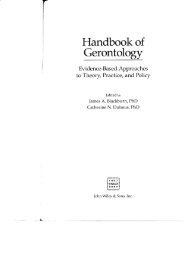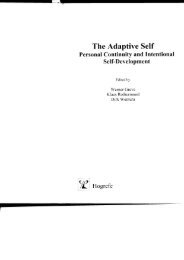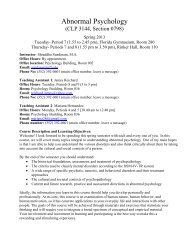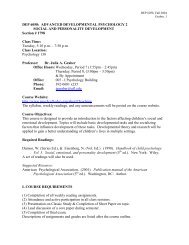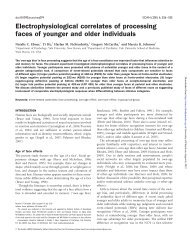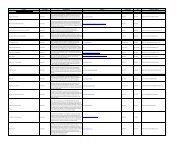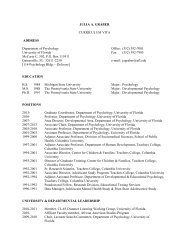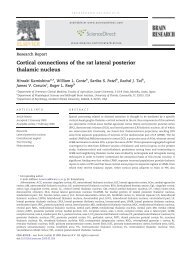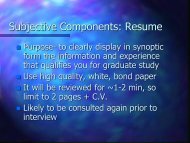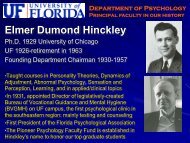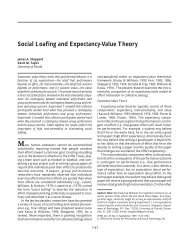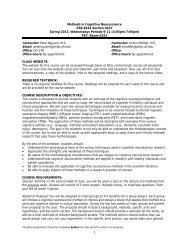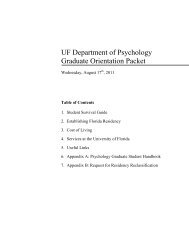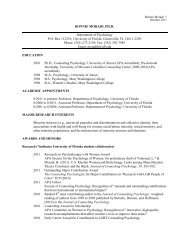Lise Abrams - University of Florida Department of Psychology
Lise Abrams - University of Florida Department of Psychology
Lise Abrams - University of Florida Department of Psychology
You also want an ePaper? Increase the reach of your titles
YUMPU automatically turns print PDFs into web optimized ePapers that Google loves.
Curriculum Vitae<br />
LISE ABRAMS<br />
<strong>Department</strong> <strong>of</strong> <strong>Psychology</strong><br />
2915 NW 27th Terrace<br />
<strong>University</strong> <strong>of</strong> <strong>Florida</strong> Gainesville, FL 32605<br />
P.O. Box 112250<br />
Gainesville, FL 32611-2250<br />
Phone: (352) 273-2149<br />
E-mail: abrams@ufl.edu<br />
FAX: (352) 392-7985<br />
Web site: http://www.psych.ufl.edu/~abrams<br />
EDUCATION<br />
<strong>University</strong> <strong>of</strong> California Los Angeles, Ph.D. in Cognitive <strong>Psychology</strong>, 1997, with a minor in<br />
Measurement and Psychometrics<br />
<strong>University</strong> <strong>of</strong> California Los Angeles, M.A. in Cognitive <strong>Psychology</strong>, 1992<br />
Pomona College, B.A. cum laude in double major <strong>Psychology</strong> and Mathematics, 1991<br />
ACADEMIC APPOINTMENTS<br />
Undergraduate Coordinator, <strong>University</strong> <strong>of</strong> <strong>Florida</strong>, <strong>Department</strong> <strong>of</strong> <strong>Psychology</strong>, July 2008-Present<br />
Associate Pr<strong>of</strong>essor, <strong>University</strong> <strong>of</strong> <strong>Florida</strong>, <strong>Department</strong> <strong>of</strong> <strong>Psychology</strong>, August 2006-Present<br />
Affiliate Pr<strong>of</strong>essor, <strong>University</strong> <strong>of</strong> <strong>Florida</strong>, <strong>Department</strong> <strong>of</strong> Educational <strong>Psychology</strong>, 2007-2010<br />
Director, Cognitive and Sensory Processes Doctoral Program, <strong>University</strong> <strong>of</strong> <strong>Florida</strong>, <strong>Department</strong> <strong>of</strong><br />
<strong>Psychology</strong>, 2006-2008<br />
Assistant Pr<strong>of</strong>essor, <strong>University</strong> <strong>of</strong> <strong>Florida</strong>, <strong>Department</strong> <strong>of</strong> <strong>Psychology</strong>, December 1997-August 2006<br />
Faculty Associate, <strong>University</strong> <strong>of</strong> <strong>Florida</strong> Center for Gerontological Studies, 1998-2006<br />
Core Faculty, <strong>University</strong> <strong>of</strong> <strong>Florida</strong> Institute on Aging, 1999-2003<br />
Visiting Lecturer, Pomona College, 1995<br />
RESEARCH INTERESTS<br />
Memory and language processes in young and older adults, specifically the processes involved in<br />
comprehending and retrieving words and the changes in these processes that occur with normal aging.<br />
Specific areas <strong>of</strong> interest include: (1) memory retrieval failures such as the tip-<strong>of</strong>-the-tongue states,<br />
which are naturally-occurring retrieval failures that are characterized by a temporary inability to recall a<br />
known word; and (2) language errors such as the production <strong>of</strong> spelling errors and homophone<br />
substitution errors.<br />
HONORS AND AWARDS<br />
Academy <strong>of</strong> Distinguished Teaching Scholars, <strong>University</strong> <strong>of</strong> <strong>Florida</strong>, 2012<br />
Who's Who in America, 2012<br />
Fellow, American Psychological Association, 2011<br />
Faculty Fellowship Summer Institute in Israel, 2011<br />
Anderson Scholar Faculty Honoree, 1999-2002, 2008, 2009, 2011<br />
<strong>Florida</strong> Blue Key Distinguished Mentor <strong>of</strong> Undergraduate Research Award, 2010<br />
HHMI Science for Life Distinguished Mentor Award, 2010<br />
Psi Chi / <strong>Psychology</strong> Club Pr<strong>of</strong>essor <strong>of</strong> the Year Award, <strong>University</strong> <strong>of</strong> <strong>Florida</strong>, 2006-2007, 2008-2009<br />
Who's Who <strong>of</strong> Emerging Leaders, 2007-2008
<strong>Lise</strong> <strong>Abrams</strong><br />
Page 2<br />
Sigma Xi Young Investigator Award, 2007<br />
APA Division 20 and the Retirement Research Foundation Mentor Award in Adult Development and<br />
Aging, 2007<br />
Who’s Who <strong>of</strong> American Women, 2006-2007<br />
Who's Who in American Education, 2006-2007<br />
Women in Cognitive Science Mentorship Award, 2004<br />
College <strong>of</strong> Liberal Arts and Sciences Teaching Award, <strong>University</strong> <strong>of</strong> <strong>Florida</strong>, 2001-2002<br />
Who’s Who in Science and Engineering, 1998-1999<br />
<strong>Psychology</strong> <strong>Department</strong> Supplemental Dissertation Award, <strong>University</strong> <strong>of</strong> California Los Angeles, 1996-1997<br />
National Science Foundation Graduate Fellowship, <strong>University</strong> <strong>of</strong> California Los Angeles, 1991-1995<br />
William Lincoln Honnold Fellowship, Pomona College, 1991<br />
Pew Foundation Undergraduate Summer Research Fellowship, Stanford <strong>University</strong>, June 1990-August 1990<br />
Senior Prize in <strong>Psychology</strong>, Pomona College, 1991<br />
Pomona College Scholar, 1989-1991<br />
GRANTS<br />
EXTERNAL<br />
“A Breath-Based Medication Adherence Monitoring System for HIV/AIDS Therapies”, National<br />
Institute <strong>of</strong> Mental Health (NIMH), SBIR Phase II Grant, $1,706,039 ($1,275,543 direct), 9/01/09-<br />
8/31/11, Co-Investigator (PI is Richard Melker, <strong>Department</strong> <strong>of</strong> Anesthesiology).<br />
“Contextual Relevance in Detecting Misspellings in Old Age”, National Institute on Aging (NIA), R03,<br />
$71,154 ($50,000 direct), 9/30/01-9/29/02.<br />
“Phonological Priming <strong>of</strong> Preexisting and New Associations”, National Institute <strong>of</strong> Mental Health<br />
(NIMH), Individual National Research Service Award, $29,328, 8/1/01-12/31/02, PI mentor<br />
(awarded to Katherine White).<br />
Training grants (I serve as a potential mentor/training faculty):<br />
“Training in Treatment <strong>of</strong> Communication Disorders and in Translational Neuroscience” (Leslie<br />
Gonzalez-Rothi, PI), T32DC008768-01, NIDCD/NIH, $812,227 ($752,532 direct), 7/01/07-3/31/12.<br />
"Physical, Cognitive and Mental Health in Social Context" (Michael Marsiske, PI), T32AG05069,<br />
National Institute on Aging, $1,142,088 (estimated), 5/1/08 – 4/30/13.<br />
INTERNAL<br />
“Older Adults' Comprehension <strong>of</strong> Inferences and Negation During Reading”, <strong>University</strong> <strong>of</strong> <strong>Florida</strong><br />
Research Opportunity Fund, $30,000, 5/15/02-5/14/03.<br />
“Improving the Detection and Retrieval <strong>of</strong> Spelling in Old Age”, <strong>University</strong> <strong>of</strong> <strong>Florida</strong> College <strong>of</strong><br />
Liberal Arts and Sciences Research Award, $12,000, 1999-2000<br />
“Age-Related Changes in the Ability to Spell”, <strong>University</strong> <strong>of</strong> <strong>Florida</strong> College <strong>of</strong> Liberal Arts and<br />
Sciences Research Award, $6,300, 1997-1998<br />
“Fan Effects at the Phonological Level: Age-Related Interference in the Implicit versus Explicit<br />
Retrieval <strong>of</strong> Phonologically Similar Words”, Sigma Xi Grant-in-Aid <strong>of</strong> Research, $700, 1996-1997
<strong>Lise</strong> <strong>Abrams</strong><br />
Page 3<br />
“Computer Assisted Instruction in Cognitive <strong>Psychology</strong>”, Chancellor's Committee on Instructional<br />
Improvement Programs: Office <strong>of</strong> Instructional Development Grant, <strong>University</strong> <strong>of</strong> California Los<br />
Angeles, $4,980, 1994-1995<br />
PUBLICATIONS<br />
JOURNAL ARTICLES<br />
White, K. K., <strong>Abrams</strong>, L., & Frame, E. A. (in press). Semantic category moderates phonological<br />
priming <strong>of</strong> proper name retrieval during tip-<strong>of</strong>-the-tongue states. Language and Cognitive<br />
Processes.<br />
White, K. K., <strong>Abrams</strong>, L., Palm, G. M., & Protasi, M. A. (2012). Age-related influences on lexical<br />
selection and orthographic encoding during homophone spelling. <strong>Psychology</strong> and Aging, 27, 67-<br />
79.<br />
Farrell, M. T., & <strong>Abrams</strong>, L. (2011). Tip-<strong>of</strong>-the-tongue states reveal age differences in the syllable<br />
frequency effect. Journal <strong>of</strong> Experimental <strong>Psychology</strong>: Learning, Memory, and Cognition, 37, 277-<br />
285.<br />
<strong>Abrams</strong>, L., Farrell, M. T., & Margolin, S. J. (2010). Older adults' detection <strong>of</strong> misspellings during<br />
reading. Journal <strong>of</strong> Gerontology: Psychological Sciences, 65B, 680-683.<br />
White, K. K., <strong>Abrams</strong>, L, McWhite, C. B., & Hagler, H. L. (2010). Syntactic constraints in the<br />
retrieval <strong>of</strong> homophone orthography. Journal <strong>of</strong> Experimental <strong>Psychology</strong>: Learning, Memory, and<br />
Cognition, 36, 160-169.<br />
<strong>Abrams</strong>, L. (2009). Exploring the generality <strong>of</strong> retest effects: Commentary on "When does age-related<br />
cognitive decline begin?" Neurobiology <strong>of</strong> Aging, 30, 525-527.<br />
Margolin, S. J., & <strong>Abrams</strong>, L. (2009). Not may not be too difficult: The effects <strong>of</strong> negation on older<br />
adults’ sentence comprehension. Educational Gerontology, 35, 306-320.<br />
Trunk, D. L., & <strong>Abrams</strong>, L. (2009). Do younger and older adults’ communicative goals influence <strong>of</strong>ftopic<br />
speech in autobiographical narratives? <strong>Psychology</strong> and Aging, 24, 324-337.<br />
White, K. K., <strong>Abrams</strong>, L., & Byrd, A. L. (2009). Generation, intentionality <strong>of</strong> processing at encoding<br />
and retrieval, and age-related associative deficits. Memory, 17, 481-492.<br />
<strong>Abrams</strong>, L. (2008). Tip-<strong>of</strong>-the-tongue states yield language insights. American Scientist, 96, 234-239.<br />
<strong>Abrams</strong>, L., Trunk, D. L., & White, K. K. (2008). Visual and auditory priming influences the<br />
production <strong>of</strong> low-frequency spellings. Reading and Writing: An Interdisciplinary Journal, 21,<br />
745-762.<br />
White, K. K., <strong>Abrams</strong>, L., & Zoller, S. M., & Gibson, S. M. (2008). Why did I right that? Factors that<br />
influence the production <strong>of</strong> homophone substitution errors. The Quarterly Journal <strong>of</strong> Experimental<br />
<strong>Psychology</strong>, 61, 977-985.
<strong>Lise</strong> <strong>Abrams</strong><br />
Page 4<br />
<strong>Abrams</strong>, L., Trunk, D. L., & Merrill, L. A. (2007). Why a superman cannot help a tsunami: Activation<br />
<strong>of</strong> grammatical class influences resolution <strong>of</strong> young and older adults’ tip-<strong>of</strong>-the-tongue states.<br />
<strong>Psychology</strong> and Aging, 22, 835-845.<br />
Caserta, R. J., & <strong>Abrams</strong>, L. (2007). The relevance <strong>of</strong> situation awareness in older adults' cognitive<br />
functioning: A review. European Review <strong>of</strong> Aging and Physical Activity, 4, 3-13.<br />
Margolin, S. J., & <strong>Abrams</strong>, L. (2007). Individual differences in young and older adults' spelling: Do<br />
good spellers age better than poor spellers? Aging, Neuropsychology, and Cognition, 14,<br />
529–544.<br />
<strong>Abrams</strong>, L., & Rodriguez, E. L. (2005). Syntactic class influences phonological priming <strong>of</strong> tip-<strong>of</strong>-thetongue<br />
resolution. Psychonomic Bulletin and Review, 12, 1018-1023.<br />
James, L. E., & <strong>Abrams</strong>, L. (2005). Invited review <strong>of</strong> B. L. Schwartz (2002), Tip-<strong>of</strong>-the-tongue states:<br />
Phenomenology, mechanism, and lexical retrieval. The Quarterly Journal <strong>of</strong> Experimental<br />
<strong>Psychology</strong>: 58A, 573-576.<br />
<strong>Abrams</strong>, L., & Jennings, D. T. (2004). VoiceRelay: Voice key operation using Visual Basic. Behavior<br />
Research Methods, Instruments, and Computers, 36, 771-777.<br />
MacKay, D. G., Shafto, M., Taylor, J. K., Marian, D. E., <strong>Abrams</strong>, L., & Dyer, J. R. (2004). Relations<br />
between emotion, memory, and attention: Evidence from taboo Stroop, lexical decision, and<br />
immediate memory tasks. Memory and Cognition, 32, 474-487.<br />
White, K. K., & <strong>Abrams</strong>, L. (2004). Phonologically mediated priming <strong>of</strong> preexisting and new<br />
associations in young and older adults. Journal <strong>of</strong> Experimental <strong>Psychology</strong>: Learning, Memory,<br />
and Cognition, 30, 645-655.<br />
White, K. K., & <strong>Abrams</strong>, L. (2004). Free associations and dominance ratings <strong>of</strong> homophones for young<br />
and older adults. Behavior Research Methods, Instruments, and Computers, 36, 408-420.<br />
<strong>Abrams</strong>, L., White, K. K., & Eitel, S. L. (2003). Isolating phonological components that increase tip<strong>of</strong>-the-tongue<br />
resolution. Memory and Cognition, 31, 1153-1162.<br />
White, K. K., & <strong>Abrams</strong>, L. (2002). Does priming specific syllables during tip-<strong>of</strong>-the-tongue states<br />
facilitate word retrieval in older adults? <strong>Psychology</strong> and Aging, 17, 226-235.<br />
MacKay, D. G., <strong>Abrams</strong>, L., & Pedroza, M. J. (1999). Aging on the input versus output side:<br />
Theoretical implications <strong>of</strong> age-linked asymmetries between detecting versus retrieving<br />
orthographic information. <strong>Psychology</strong> and Aging, 14, 3-17.<br />
MacKay, D. G., & <strong>Abrams</strong>, L. (1998). Age-linked declines in retrieving orthographic knowledge:<br />
Empirical, practical, and theoretical implications. <strong>Psychology</strong> and Aging, 13, 647-662.<br />
<strong>Abrams</strong>, L., Dyer, J. R., & MacKay, D. G. (1996). Repetition blindness interacts with syntactic<br />
grouping in rapidly presented sentences. Psychological Science, 7, 100-104.
<strong>Lise</strong> <strong>Abrams</strong><br />
Page 5<br />
MacKay, D. G., <strong>Abrams</strong>, L., Pedroza, M. J., & Miller, M. D. (1996). Cross-language facilitation,<br />
semantic blindness, and the relation between language and memory: A reply to Altarriba and<br />
Soltano. Memory and Cognition, 24, 712-718.<br />
MacKay, D. G., Wulf, G., Yin, C., & <strong>Abrams</strong>, L. (1993). Relations between word perception and<br />
production: New theory and data on the verbal transformation effect. Journal <strong>of</strong> Memory and<br />
Language, 32, 624-646.<br />
INVITED BOOK CHAPTERS<br />
Farrell, M. T., <strong>Abrams</strong>, L., & White, K. K. (2012). The role <strong>of</strong> priming in lexical access and speech<br />
production. In N. Hsu and Z. Schütt (Eds.), <strong>Psychology</strong> <strong>of</strong> priming (pp. 205-244). Hauppauge, NY:<br />
Nova Science Publishers, Inc.<br />
Linderholm, T., & <strong>Abrams</strong>, L. (2011). The benefits <strong>of</strong> expressive writing on long-term memory<br />
performance. In A. M. Columbus (Ed.), Advances in psychology research (Vol. 77, pp. 293-306).<br />
Hauppauge, NY: Nova Science Publishers, Inc.<br />
<strong>Abrams</strong>, L., & Farrell, M. T. (2011). Language processing in normal aging. In J. Guendouzi, F.<br />
Loncke, & M. J. Williams (Eds.), The handbook <strong>of</strong> psycholinguistic and cognitive processes:<br />
Perspectives in communication disorders (pp. 49-73). New York, NY: <strong>Psychology</strong> Press.<br />
Bahrick, H. P., Baker, M. K., Hall, L. K., & <strong>Abrams</strong>, L. (2011). How should we define and<br />
differentiate metacognitions? In A. S. Benjamin (Ed.), Successful remembering and successful<br />
forgetting: A Festschrift in honor <strong>of</strong> Robert A. Bjork (pp. 329-346). New York, NY: <strong>Psychology</strong><br />
Press.<br />
<strong>Abrams</strong>, L., & White, K. K. (2010). Influences <strong>of</strong> word frequency, context and age on spelling. In B.<br />
C. Fabini (Ed.), Spelling skills: Acquisition, abilities and reading connection (pp. 51-76).<br />
Hauppauge, NY: Nova Science Publishers, Inc.<br />
<strong>Abrams</strong>, L., Trunk, D. L., & Margolin, S. J. (2007). Resolving tip-<strong>of</strong>-the-tongue states in young and<br />
older adults: The role <strong>of</strong> phonology. In L. O. Randal (Ed.), Aging and the elderly: <strong>Psychology</strong>,<br />
sociology, and health (pp. 1-41). Hauppauge, NY: Nova Science Publishers, Inc.<br />
<strong>Abrams</strong>, L. (2006). Studying memory and language. In G. D. Oster, Life as a psychologist: Career<br />
choices and insights (pp. 59-60). Westport, CT: Praeger Publishers.<br />
Stanley, J. H., & <strong>Abrams</strong>, L. (2006). Theories <strong>of</strong> aging. In N. J. Salkind (Ed.), Encyclopedia <strong>of</strong> human<br />
development (Vol. 3, pp. 1261-1266). Thousand Oaks, CA: Sage Publications.<br />
<strong>Abrams</strong>, L., & Stanley, J. H. (2004). The detection and retrieval <strong>of</strong> spelling in older adults. In S. P.<br />
Shohov (Ed.), Advances in psychology research (Vol. 33, pp. 87-109). Hauppauge, NY: Nova<br />
Science Publishers, Inc.<br />
MacKay, D. G., James, L. E., & <strong>Abrams</strong>, L. (2002). Cross-language facilitation, semantic blindness,<br />
and the relation between language and memory: Replications <strong>of</strong> Altarriba and Soltano (1996) and
<strong>Lise</strong> <strong>Abrams</strong><br />
Page 6<br />
support for a new theory. In R. R. Heredia & J. Altarriba (Eds.), Bilingual sentence processing (pp.<br />
89-109). Amsterdam: Elsevier Science Publishers.<br />
MacKay, D. G., & <strong>Abrams</strong>, L. (1996). Language, memory, and aging: Distributed deficits and the<br />
structure <strong>of</strong> new-versus-old connections. In J. E. Birren & K. W. Schaie (Eds.), Handbook <strong>of</strong> the<br />
psychology <strong>of</strong> aging (4th ed., pp. 251-265). San Diego: Academic Press.<br />
MANUSCRIPTS SUBMITTED<br />
<strong>Abrams</strong>, L., White, K. K., Merrill, L. A., & Hausler, L. (2012). Nonwords prime tip-<strong>of</strong>-the-tongue<br />
resolution. Manuscript submitted for publication.<br />
Farrell, M. T., & <strong>Abrams</strong>, L. (2012). Competing syllable frequency effects on picture naming and<br />
picture-word interference. Manuscript submitted for publication.<br />
Jennings, D. T., & <strong>Abrams</strong>, L. (2012). Automatic detection <strong>of</strong> voice onset times from waveform data<br />
using Micros<strong>of</strong>t Excel. Manuscript submitted for publication.<br />
Pelham, S. D., & <strong>Abrams</strong>, L. (2012). Cognitive advantages and disadvantages in early and late<br />
bilinguals. Manuscript submitted for publication.<br />
White, K. K., <strong>Abrams</strong>, L., & Zoller, S. M. (2012). Perception-production asymmetries in homophone<br />
spelling: The unique influence <strong>of</strong> aging. Manuscript submitted for publication.<br />
MANUSCRIPTS IN PREPARATION<br />
<strong>Abrams</strong>, L., & Farrell, M. T. (2012). The influence <strong>of</strong> phonological, lexical, and syntactic factors on<br />
picture naming in young and older adults. Manuscript in preparation.<br />
<strong>Abrams</strong>, L., Farrell, M. T., & Pelham, S. D. (2012). Target frequency and distractor grammatical<br />
class moderate phonological facilitation in the picture-word interference task. Manuscript in<br />
preparation.<br />
<strong>Abrams</strong>, L., & Morini, G. (2012). Mediated priming <strong>of</strong> bilinguals' resolution <strong>of</strong> tip-<strong>of</strong>-the-tongue<br />
states. Manuscript in preparation.<br />
<strong>Abrams</strong>, L., & Pelham, S. D. (2012). A bilingual advantage in priming tip-<strong>of</strong>-the-tongue resolution.<br />
Manuscript in preparation.<br />
<strong>Abrams</strong>, L., Robinson, V. B., & Bahrick, H. P. (2012). Restoring access to words following retrieval<br />
failures in young and older adults. Manuscript in preparation.<br />
<strong>Abrams</strong>, L., Thomas, M. J., & Pelham, S. D. (2012). Searching for inhibition during tip-<strong>of</strong>-the-tongue<br />
states: The relevance <strong>of</strong> time between priming and resolution. Manuscript in preparation.<br />
<strong>Abrams</strong>, L., Trunk, D. L., Hadley, C. B., & Margolin, S. J. (2012). Priming spelling retrieval in young<br />
and older adults. Manuscript in preparation.<br />
INVITED TALKS
<strong>Abrams</strong>, L., & Farrell, M. T. (2010, October). Word retrieval problems in aging: First-syllable<br />
frequency influences tip-<strong>of</strong>-the-tongue states. Paper presented at the International Conference on<br />
Aging and Cognition, Dortmund, Germany.<br />
<strong>Lise</strong> <strong>Abrams</strong><br />
Page 7<br />
<strong>Abrams</strong>, L. (2007, November). Activating phonology when word retrieval fails: What tip-<strong>of</strong>-the-tongue<br />
states tell about language production. Young Investigator Award lecture presented at the 2007<br />
Sigma Xi Annual Meeting and Student Research Conference, Orlando, FL.<br />
CONVENTION PRESENTATIONS (last 7 years only)<br />
Davis, D. K., & <strong>Abrams</strong>, L. (2012, November). Semantic and phonological distractors influence<br />
production <strong>of</strong> proper names. Poster to be presented at the 53 rd annual meeting <strong>of</strong> the Psychonomic<br />
Society, Minneapolis, MN.<br />
White, K. K., LaBat, L. R., Rhynes, A. M., & <strong>Abrams</strong>, L. (2012, November). Emotion moderates<br />
phonological facilitation in picture-word interference. Poster to be presented at the 53 rd annual<br />
meeting <strong>of</strong> the Psychonomic Society, Minneapolis, MN.<br />
Farrell, M. T., Davis, D. K., <strong>Abrams</strong>, L., & White, Katherine K. (2012, April). Separate but equal: First<br />
and last name primes facilitate TOT resolution in young and older adults. Poster presented at the<br />
14 th biennial Cognitive Aging Conference, Atlanta, GA.<br />
White, K. K., Emery, H. E., Mattancheril, S. S., Stowe, R. M., & <strong>Abrams</strong>, L. (2012, April). Six degrees<br />
<strong>of</strong> Kevin Bacon: Does semantic competition mediate older adults' phonological priming <strong>of</strong> TOT<br />
resolution? Poster presented at the 14 th biennial Cognitive Aging Conference, Atlanta, GA.<br />
Farrell, M. T., <strong>Abrams</strong>, L., & White, K. K. (2011, November). Last but not least: Last names prime TOT<br />
resolution for famous names. Poster presented at the 52 nd annual meeting <strong>of</strong> the Psychonomic<br />
Society, Seattle, WA.<br />
Pelham, S. D., & <strong>Abrams</strong>, L. (2011, November). Evaluating lexical access and executive function in late<br />
bilinguals, lifelong bilinguals, and monolinguals. Poster presented at the 52 nd annual meeting <strong>of</strong> the<br />
Psychonomic Society, Seattle, WA.<br />
White, K. K., Frame, E. A., & <strong>Abrams</strong>, L. (2011, November). Semantic category moderates<br />
phonological priming <strong>of</strong> proper name retrieval. Poster presented at the 52 nd annual meeting <strong>of</strong> the<br />
Psychonomic Society, Seattle, WA.<br />
Leon, S., Altmann, L. J. P., <strong>Abrams</strong>, L., Gonzalez Rothi, L., & Heilman, K. (2011, November).<br />
Storytelling using semantically unrelated words in young and older adults. Poster presented at the<br />
annual meeting <strong>of</strong> the American Speech-Language-Hearing Association, San Diego, CA.<br />
White, K. K., Frame, E. A., Palm, G. M., Stowe, R. M., & <strong>Abrams</strong>, L. (2011, May). Phonological<br />
priming and semantic competition influence the retrieval <strong>of</strong> proper names. Poster presented at the<br />
23 rd annual convention <strong>of</strong> the Association for Psychological Science, Washington, DC.
<strong>Lise</strong> <strong>Abrams</strong><br />
Page 8<br />
Farrell, M. T., Pelham, S. D., & <strong>Abrams</strong>, L. (2010, November). Timing is everything: Exploring<br />
competition for lexical selection during picture naming. Poster presented at the 51 st annual meeting<br />
<strong>of</strong> the Psychonomic Society, St. Louis, MO.<br />
Pelham, S. D., & <strong>Abrams</strong>, L. (2010, November). Advantages <strong>of</strong> bilingualism in priming TOT resolution.<br />
Paper presented at the 51 st annual meeting <strong>of</strong> the Psychonomic Society, St. Louis, MO.<br />
White, K. K., Palm, G. M., Ladd, A. M., & <strong>Abrams</strong>, L. (2010, November). Age-related changes in<br />
syntactic constraints during homophone spelling. Paper presented at the 51 st annual meeting <strong>of</strong> the<br />
Psychonomic Society, St. Louis, MO.<br />
Farrell, M. T., & <strong>Abrams</strong>, L. (2010, April). Paradoxical effects <strong>of</strong> syllable frequency on young and older<br />
adults’ picture naming. Poster presented at the 13 th biennial Cognitive Aging Conference, Atlanta,<br />
GA.<br />
McClung, J. S., <strong>Abrams</strong>, L., Altmann, L. J. P., Gonzalez-Rothi, L., Marsiske, M., & Rosenbek, J. C.<br />
(2010, April). Effects <strong>of</strong> notetaking training on note fidelity and recall in healthy older adults. Poster<br />
presented at the 13 th biennial Cognitive Aging Conference, Atlanta, GA.<br />
Pelham, S. D., Farrell, M. T., & <strong>Abrams</strong>, L. (2010, April). When distractors aren’t distracting:<br />
Influences <strong>of</strong> frequency on older adults’ picture naming. Poster presented at the 13 th biennial<br />
Cognitive Aging Conference, Atlanta, GA.<br />
White, K. K., Protasi, M. A., & <strong>Abrams</strong>, L. (2010, April). Spelling homophones gets better with age:<br />
Influences from orthography and semantics. Poster presented at the 13 th biennial Cognitive Aging<br />
Conference, Atlanta, GA.<br />
Farrell, M. T., & <strong>Abrams</strong>, L. (2009, November). Age-related differences in the syllable frequency effect:<br />
Evidence from tip-<strong>of</strong>-the-tongue states. Poster presented at the 50 th annual meeting <strong>of</strong> the<br />
Psychonomic Society, Boston, MA.<br />
Pelham, S. D., <strong>Abrams</strong>, L., & White, K. K. (2009, November). A tale <strong>of</strong> two factors: Grammatical class<br />
ambiguity and word frequency effects on TOT resolution. Poster presented at the 50 th annual meeting<br />
<strong>of</strong> the Psychonomic Society, Boston, MA.<br />
Thomas, M. J., & <strong>Abrams</strong>, L. (2009, November). Searching for inhibition: The effects <strong>of</strong> delayed<br />
retrieval on resolving tip-<strong>of</strong>-the tongue states. Poster presented at the 50 th annual meeting <strong>of</strong> the<br />
Psychonomic Society, Boston, MA.<br />
Farrell, M. T., <strong>Abrams</strong>, L., & Moreland, M. B. (2008, November). Is faster always better? The influence<br />
<strong>of</strong> phonological distractors on picture naming. Poster presented at the 49 th annual meeting <strong>of</strong> the<br />
Psychonomic Society, Chicago, IL.<br />
Morini, G., & <strong>Abrams</strong>, L. (2008, November). Resolving bilinguals' tip-<strong>of</strong>-the-tongue states: Priming<br />
phonology within and across languages. Poster presented at the 49 th annual meeting <strong>of</strong> the<br />
Psychonomic Society, Chicago, IL.
<strong>Lise</strong> <strong>Abrams</strong><br />
Page 9<br />
White, K. W., McWhite, C. B., Hagler, H. L., & <strong>Abrams</strong>, L. (2008, November). Priming <strong>of</strong> grammatical<br />
class influences homophone substitution errors. Poster presented at the 49 th annual meeting <strong>of</strong> the<br />
Psychonomic Society, Chicago, IL.<br />
Margolin, S. J., & <strong>Abrams</strong>, L. (2008, April). Not may not be too difficult: The effects <strong>of</strong> negation on<br />
older adults' reading comprehension. Poster presented at the 12 th biennial Cognitive Aging<br />
Conference, Atlanta, GA.<br />
Trunk, D. L., & <strong>Abrams</strong>, L. (2008, April). Do young and older adults' communicative goals influence<br />
<strong>of</strong>f-topic speech in autobiographical narratives? Poster presented at the 12 th biennial Cognitive<br />
Aging Conference, Atlanta, GA.<br />
White, K. W., Zoller, S. M., <strong>Abrams</strong>, L., Protasi, M. A., & O'Sullivan, L. K. (2008, April). Can we see<br />
what we can't spell? Priming young and older adults' detection and production <strong>of</strong> homophone<br />
errors. Poster presented at the 12 th biennial Cognitive Aging Conference, Atlanta, GA.<br />
Chang, Y., Bauer, R. M., Loring, D. W., Marsiske, M., Heilman, K. M., Kerkh<strong>of</strong>f, T., & <strong>Abrams</strong>, L.<br />
(2008, February). Associative memory in normal aging and individuals with mild cognitive<br />
impairment. Paper presented at the 36 th annual meeting <strong>of</strong> the International Neuropsychological<br />
Society, Waikoloa, Hawaii.<br />
Chang, Y., Bauer, R. M., Loring, D. W., Marsiske, M., Heilman, K. M., Kerkh<strong>of</strong>f, T., & <strong>Abrams</strong>, L.<br />
(2008, February). Medial temporal and frontal lobe involvements in associative memory. Poster<br />
presented at the 36 th annual meeting <strong>of</strong> the International Neuropsychological Society, Waikoloa,<br />
Hawaii.<br />
<strong>Abrams</strong>, L., White, K. K., Merrill, L. A., & Hausler, L. (2007, November). Grammatical class influences<br />
how nonwords prime tip-<strong>of</strong>-the-tongue resolution. Paper presented at the 48 th annual meeting <strong>of</strong> the<br />
Psychonomic Society, Long Beach, CA.<br />
<strong>Abrams</strong>, L., & Merrill, L. A. (2007, November). Phonologically-mediated priming resolves tip-<strong>of</strong>-thetongue<br />
states. Poster presented at the 48 th annual meeting <strong>of</strong> the Psychonomic Society, Long Beach,<br />
CA.<br />
White, K., K., Gibson, S. M., Zoller, S. M., & <strong>Abrams</strong>, L. (2007, November). Orthographic priming and<br />
homophone substitution errors: Producing similarly-spelled words might influence what you right.<br />
Poster presented at the 48 th annual meeting <strong>of</strong> the Psychonomic Society, Long Beach, CA.<br />
<strong>Abrams</strong>, L. (2007, August). Misspelling perception influences older adults' recall: The relevance <strong>of</strong><br />
context. Paper presented as part <strong>of</strong> a Division 20 symposium at the 115 th annual convention <strong>of</strong> the<br />
American Psychological Association, San Francisco, CA.<br />
Bahrick, H. P., Baker, M. K., Barker, J. M., Parnes, S. A., Polter, E., Hall, L. K., & <strong>Abrams</strong>, L. (2007,<br />
May). Functional overlap between tip-<strong>of</strong>-the-tongue and feeling <strong>of</strong> knowing predictions. Poster<br />
presented at the 19 th annual convention <strong>of</strong> the Association for Psychological Science, Washington,<br />
DC.
Parr, K., Linderholm, T., & <strong>Abrams</strong>, L. (2006, November). Writing tasks influence fan effect<br />
performance for low and high working-memory capacity individuals. Poster presented at the 47 th<br />
annual meeting <strong>of</strong> the Psychonomic Society, Houston, TX.<br />
<strong>Lise</strong> <strong>Abrams</strong><br />
Page 10<br />
<strong>Abrams</strong>, L., Bahrick, H. P., & Robinson. V. B. (2006, April). Restoring young and older adults’ access<br />
to words following retrieval failures. Poster presented at the 11 th biennial Cognitive Aging<br />
Conference, Atlanta, GA.<br />
<strong>Abrams</strong>, L., Trunk, D. L., & Merrill, L. A. (2006, April). The role <strong>of</strong> grammatical class in resolving<br />
young, young-old, and old-old adults’ tip-<strong>of</strong>-the-tongue states: Why Superman cannot help a<br />
tsunami. Poster presented at the 11 th biennial Cognitive Aging Conference, Atlanta, GA.<br />
Margolin, S. J., Bodack, K. L., & <strong>Abrams</strong>, L. (2006, April). The effects <strong>of</strong> negation on young and older<br />
adults’ perception <strong>of</strong> spelling. Poster presented at the 11 th biennial Cognitive Aging Conference,<br />
Atlanta, GA.<br />
Rashid, M. M., Trunk, D. L., & <strong>Abrams</strong>, L. (2006, April). How perceiving misspellings during reading<br />
influences the retrieval <strong>of</strong> similarly-spelled words. Poster presented at the 11 th biennial Cognitive<br />
Aging Conference, Atlanta, GA.<br />
White, K. K., Byrd, A. L., Hock, C., & <strong>Abrams</strong>, L. (2006, April). Age-related differences in the use <strong>of</strong><br />
homophones to learn knew associations. Poster presented at the 11 th biennial Cognitive Aging<br />
Conference, Atlanta, GA.<br />
White, K. K., Zoller, S. M., & <strong>Abrams</strong>, L. (2006, April). Why did I right that? Older adults’ production<br />
<strong>of</strong> homophone spelling errors. Poster presented at the 11 th biennial Cognitive Aging Conference,<br />
Atlanta, GA.<br />
Sell, A. J., Margolin, S. J., Trunk, D. L., & <strong>Abrams</strong>, L. (2006, March). Using homophones in auditory<br />
priming <strong>of</strong> tip-<strong>of</strong>-the-tongue resolution. Poster presented at Southeastern Psychological Association,<br />
Atlanta, GA.<br />
Caserta, R. J., Barnes, R., & <strong>Abrams</strong>, L. (2005, June). A conceptual framework for situation awareness<br />
and mental imagery in dynamic sports: A new view. Poster presented at the annual meeting <strong>of</strong> the<br />
North American Society for the <strong>Psychology</strong> <strong>of</strong> Sport and Physical Activity (NASPSPA), St.<br />
Petersburg Beach, FL.<br />
<strong>Abrams</strong>, L., Bahrick, H. P., & Robinson, V. B. (2005, May). Restoring young and older adults' access to<br />
words following retrieval failures. Poster presented at the 17 th annual convention <strong>of</strong> the American<br />
Psychological Society, Los Angeles, CA.<br />
Margolin, S. J., & <strong>Abrams</strong>, L. (2005, May). Implicit and explicit retrieval <strong>of</strong> spelling in young and older<br />
adults. Poster presented at the 17 th annual convention <strong>of</strong> the American Psychological Society, Los<br />
Angeles, CA.<br />
Trunk, D. L., & <strong>Abrams</strong>, L. (2005, May). Aging and the role <strong>of</strong> phonology in encoding new lexical<br />
associations. Poster presented at the 17 th annual convention <strong>of</strong> the American Psychological Society,<br />
Los Angeles, CA.
<strong>Lise</strong> <strong>Abrams</strong><br />
Page 11<br />
LOCAL TALKS (last 7 years only)<br />
Farrell, M. T., & <strong>Abrams</strong>, L. (2011, December). Phonological priming <strong>of</strong> proper names in young and<br />
older adults. Talk presented at the Center for Neuropsychological Studies Brown Bag, Language and<br />
Brain Group, Gainesville, FL.<br />
<strong>Abrams</strong>, L. (2010, November). Language processing in healthy aging. Talk presented at the Institute for<br />
Learning in Retirement, Oak Hammock, Gainesville, FL.<br />
<strong>Abrams</strong>, L. (2010, September). What tip-<strong>of</strong>-the-tongue states tell us about language production…and<br />
healthy aging. Talk presented at the Seminar in Psychological Science, Gainesville, FL.<br />
<strong>Abrams</strong>, L. (2010, February). Searching for inhibition during tip-<strong>of</strong>-the-tongue states: The relevance <strong>of</strong><br />
time between priming and resolution. Talk presented at the Center for Neuropsychological Studies<br />
Brown Bag, Gainesville, FL.<br />
<strong>Abrams</strong>, L. (2009, October). I'll never forget what's her name: Why word-finding problems increase<br />
with age. Talk presented at the Institute for Learning in Retirement, Oak Hammock, Gainesville, FL.<br />
<strong>Abrams</strong>, L. (2009, February). Young and older adults’ communicative goals and their relationship to<br />
<strong>of</strong>f-topic speech. Talk presented at the Developmental Brown Bag, Gainesville, FL.<br />
<strong>Abrams</strong>, L. (2008, February). Searching for inhibition <strong>of</strong> tip-<strong>of</strong>-the-tongue resolution. Talk presented to<br />
the Language and Brain Group, Gainesville, FL<br />
<strong>Abrams</strong>, L. (2007, September). What tip-<strong>of</strong>-the-tongue states tell us about language production. Talk<br />
presented at the Seminar in Psychological Science, Gainesville, FL.<br />
<strong>Abrams</strong>, L. (2007, August). I'll never forget what's-her-name: Why tip-<strong>of</strong>-the-tongue states increase with<br />
age. Talk presented at the Developmental Brown Bag, Gainesville, FL.<br />
<strong>Abrams</strong>, L. (2007, June). I'll never forget what's her name: Why word-finding problems increase with<br />
age. Talk presented at the PrimeTime Institute Seminar Series, Santa Fe Community College,<br />
Gainesville, FL.<br />
<strong>Abrams</strong>, L. (2006, October). Why did I right that? Factors that influence the production <strong>of</strong> homophone<br />
substitution errors. Talk presented at the Center for Neuropsychological Studies Brown Bag,<br />
Gainesville, FL.<br />
<strong>Abrams</strong>, L. (2006, September). Why did I right that? Factors that influence the production <strong>of</strong><br />
homophone substitution errors. Talk presented at the Cognitive Forum, Gainesville, FL.<br />
<strong>Abrams</strong>, L. (2006, August). Older adults' tip-<strong>of</strong>-the-tongue states: The role <strong>of</strong> phonology. Talk presented<br />
at the Human Memory and Aging Colloquium, Gainesville, FL.
<strong>Lise</strong> <strong>Abrams</strong><br />
Page 12<br />
<strong>Abrams</strong>, L. (2005, November). The role <strong>of</strong> grammatical class in resolving young, young-old, and<br />
old-old adults’ tip-<strong>of</strong>-the-tongue states: Why Superman cannot help a tsunami. Talk presented at the<br />
Cognitive Forum, Gainesville, FL.<br />
<strong>Abrams</strong>, L. (2005, March). Restoring young and older adults’ access to words following retrieval<br />
failures. Talk presented at the Cognitive Forum, Gainesville, FL.<br />
<strong>Abrams</strong>, L. (2005, January). The role <strong>of</strong> syntactic factors in phonological priming <strong>of</strong> tip-<strong>of</strong>-the-tongue<br />
resolution. Talk presented to the Language and Brain Group, Gainesville, FL<br />
PROFESSIONAL EXPERIENCE<br />
TEACHING EXPERIENCE<br />
Undergraduate:<br />
Cognitive <strong>Psychology</strong> (lecture)<br />
Introduction to Psychological Statistics (lecture, taught at Pomona College)<br />
Issues and Concepts in Gerontology (lecture)<br />
Special Topics in <strong>Psychology</strong> (seminar)<br />
Language and Thought<br />
Language Production and Aging<br />
Multidisciplinary Approaches to Cognition<br />
Graduate:<br />
Survey <strong>of</strong> Cognition and Sensory Processes (lecture)<br />
Issues and Concepts in Gerontology (lecture)<br />
Current Issues in Cognition and Sensory Processes (seminar):<br />
Using Visual Basic Programming for Psychological Research<br />
Multidisciplinary Approaches to Cognition<br />
Language and Thought<br />
Theories <strong>of</strong> Cognitive Aging<br />
Language and Cognition in Aging<br />
Language Production and Aging<br />
CONSULTING EXPERIENCE<br />
Expert witness, The Law Offices <strong>of</strong> Boyer, Tanzler, & Sussman, July 2005<br />
Statistical consultant, Novamin Technology, Inc., 2004-2007, 2010<br />
Statistical consultant. Gave a week-long seminar presentation, “Summer Institute for Statistics in<br />
Cognitive Aging”, <strong>University</strong> <strong>of</strong> California, Los Angeles, Summer 1999<br />
REVIEWING EXPERIENCE<br />
Journals:<br />
Aging, Neuropsychology, and Cognition<br />
Brain and Cognition<br />
Cognition<br />
Cognitive, Affective, and Behavioral Neuroscience<br />
Consciousness and Cognition<br />
Journal <strong>of</strong> Gerontology: Psychological<br />
Sciences<br />
Journal <strong>of</strong> Memory and Language<br />
Language and Cognitive Processes<br />
Language and Speech
<strong>Lise</strong> <strong>Abrams</strong><br />
Page 13<br />
European Journal <strong>of</strong> Cognitive <strong>Psychology</strong><br />
Experimental Aging Research<br />
Experimental <strong>Psychology</strong><br />
Journal <strong>of</strong> Experimental <strong>Psychology</strong>: General<br />
Journal <strong>of</strong> Experimental <strong>Psychology</strong>: Learning,<br />
Memory, and Cognition<br />
Memory and Cognition<br />
Neurobiology <strong>of</strong> Aging<br />
<strong>Psychology</strong> and Aging<br />
Visual Cognition<br />
Grants:<br />
Romanian National Council for Scientific Research, Exploratory and Postdoctoral Research Projects,<br />
2011<br />
The Biotechnology and Biological Sciences Research Council (BBSRC), Research Grants, 2010<br />
The Dunhill Medical Trust, Grants and Research Committee, 2009<br />
Netherlands Organisation for Scientific Research (Social Sciences), 2007 Open Programme<br />
Competition<br />
Issac Newton Trust, 2004 Grant Competition<br />
Alzheimer’s Association, 2003 Grant Competition<br />
Conventions and Awards:<br />
Gerontological Society <strong>of</strong> America annual convention, Behavioral Sciences Section conference<br />
abstracts, 2003-2005<br />
Leighton E. Cluff Award for Aging Research (student competition), <strong>University</strong> <strong>of</strong> <strong>Florida</strong>, 2003<br />
American Psychological Association annual convention, Division 20 conference abstracts, 2002<br />
American Psychological Association, Division 20 Student Award competition, 1998-2001<br />
ADVISOR EXPERIENCE<br />
Dissertations:<br />
Farrell, Meagan T. (expected 2012). What’s in a name? Predictors <strong>of</strong> proper name retrieval deficits in<br />
older age. <strong>Department</strong> <strong>of</strong> <strong>Psychology</strong>, <strong>University</strong> <strong>of</strong> <strong>Florida</strong>.<br />
Margolin, Sara J. (2007). Negation comprehension and aging: The role <strong>of</strong> inhibition and the impact <strong>of</strong><br />
compensation during reading. <strong>Department</strong> <strong>of</strong> <strong>Psychology</strong>, <strong>University</strong> <strong>of</strong> <strong>Florida</strong>.<br />
Trunk, Dunja L. (2007). The effect <strong>of</strong> communicative goals on telling two types <strong>of</strong> autobiographical<br />
narratives in young and older adults. <strong>Department</strong> <strong>of</strong> <strong>Psychology</strong>, <strong>University</strong> <strong>of</strong> <strong>Florida</strong>.<br />
White, Katherine. K. (2002). Phonological priming <strong>of</strong> preexisting and new associations in young and<br />
elderly adults. <strong>Department</strong> <strong>of</strong> <strong>Psychology</strong>, <strong>University</strong> <strong>of</strong> <strong>Florida</strong>.<br />
Master's theses:<br />
Pelham, Sabra D. (2012). Evaluating lexical access and executive function in monolinguals, late<br />
bilinguals, and early bilinguals. <strong>Department</strong> <strong>of</strong> <strong>Psychology</strong>, <strong>University</strong> <strong>of</strong> <strong>Florida</strong>.<br />
Farrell, Meagan T. (2009). Age differences in the syllable frequency effect on speech production:<br />
Comparisons between tip-<strong>of</strong>-the-tongue states and picture naming. <strong>Department</strong> <strong>of</strong> <strong>Psychology</strong>,<br />
<strong>University</strong> <strong>of</strong> <strong>Florida</strong>.
Merrill, Lisa A. (2007). Influences <strong>of</strong> mediated priming on tip-<strong>of</strong>-the-tongue incidence and resolution.<br />
<strong>Department</strong> <strong>of</strong> <strong>Psychology</strong>, <strong>University</strong> <strong>of</strong> <strong>Florida</strong>.<br />
Margolin, Sara J. (2005). Implicit and explicit retrieval <strong>of</strong> spelling in young and older adults.<br />
<strong>Department</strong> <strong>of</strong> <strong>Psychology</strong>, <strong>University</strong> <strong>of</strong> <strong>Florida</strong>.<br />
Trunk, Dunja L. (2004). Aging and the role <strong>of</strong> phonology in encoding new lexical associations.<br />
<strong>Department</strong> <strong>of</strong> <strong>Psychology</strong>, <strong>University</strong> <strong>of</strong> <strong>Florida</strong>.<br />
Stanley, Jennifer H. (2001). Activation, dominance, and lexical ambiguity resolution in older adults.<br />
<strong>Department</strong> <strong>of</strong> <strong>Psychology</strong>, <strong>University</strong> <strong>of</strong> <strong>Florida</strong>.<br />
<strong>Lise</strong> <strong>Abrams</strong><br />
Page 14<br />
White, Katherine K. (1999). Aging, phonological priming, and tip-<strong>of</strong>-the-tongue resolution. <strong>Department</strong><br />
<strong>of</strong> <strong>Psychology</strong>, <strong>University</strong> <strong>of</strong> <strong>Florida</strong>.<br />
Undergraduate senior theses:<br />
Thomas, Max J. (2009). The effects <strong>of</strong> delayed retrieval on resolving tip-<strong>of</strong>-the-tongue states.<br />
<strong>Department</strong> <strong>of</strong> <strong>Psychology</strong>, <strong>University</strong> <strong>of</strong> <strong>Florida</strong>.<br />
Morini, Giovanna (2007). The influence <strong>of</strong> grammatical class on bilinguals' resolution <strong>of</strong> tip-<strong>of</strong>-thetongue<br />
states. <strong>Department</strong> <strong>of</strong> <strong>Psychology</strong>, <strong>University</strong> <strong>of</strong> <strong>Florida</strong>.<br />
Bodack, Kate L. (2006). The effect <strong>of</strong> negation on young and older adults’ detection <strong>of</strong> misspellings.<br />
<strong>Department</strong> <strong>of</strong> <strong>Psychology</strong>, <strong>University</strong> <strong>of</strong> <strong>Florida</strong>.<br />
Rashid, Megan M. (2006). How perceiving misspellings during reading influences the retrieval <strong>of</strong><br />
similarly-spelled words. <strong>Department</strong> <strong>of</strong> <strong>Psychology</strong>, <strong>University</strong> <strong>of</strong> <strong>Florida</strong>.<br />
Sell, Andrea J. (2006). Using homophones in auditory priming <strong>of</strong> tip-<strong>of</strong>-the-tongue resolution.<br />
<strong>Department</strong> <strong>of</strong> <strong>Psychology</strong>, <strong>University</strong> <strong>of</strong> <strong>Florida</strong>.<br />
Robinson, Vanessa B. (2004). Restoring access to words following retrieval failures in young and older<br />
adults. <strong>Department</strong> <strong>of</strong> <strong>Psychology</strong>, <strong>University</strong> <strong>of</strong> <strong>Florida</strong>.<br />
Rodriguez, Emily L. (2004). The effect <strong>of</strong> syntax on phonological priming <strong>of</strong> tip-<strong>of</strong>-the-tongue<br />
resolution. <strong>Department</strong> <strong>of</strong> <strong>Psychology</strong>, <strong>University</strong> <strong>of</strong> <strong>Florida</strong>.<br />
Parn<strong>of</strong>iello, John J. (2003). Repetition blindness and aging: Factors that facilitate and inhibit the<br />
binding process in older adults. <strong>Department</strong> <strong>of</strong> <strong>Psychology</strong>, <strong>University</strong> <strong>of</strong> <strong>Florida</strong>.<br />
Eitel, Stacy L. (2002). The effects <strong>of</strong> phonological priming and word production on tip-<strong>of</strong>-the-tongue<br />
resolution. <strong>Department</strong> <strong>of</strong> <strong>Psychology</strong>, <strong>University</strong> <strong>of</strong> <strong>Florida</strong>.<br />
Wetherington, Jaclyn M. (2001). Inhibiting tip-<strong>of</strong>-the-tongue resolution with auditorily-presented<br />
phonological primes. <strong>Department</strong> <strong>of</strong> <strong>Psychology</strong>, <strong>University</strong> <strong>of</strong> <strong>Florida</strong>.
<strong>Lise</strong> <strong>Abrams</strong><br />
Page 15<br />
Borovsky, Arielle A. (2001). Interactions <strong>of</strong> lag, syntax, lexical class, and aging with repetition<br />
blindness. <strong>Department</strong> <strong>of</strong> <strong>Psychology</strong>, <strong>University</strong> <strong>of</strong> <strong>Florida</strong>.<br />
SOCIETY MEMBERSHIPS<br />
Women in Cognitive Science, 2004-Present<br />
Psychonomic Society (Member, 2004-Present; Associate, 1997-2004)<br />
Gerontological Society <strong>of</strong> America, 2002-Present<br />
American Psychological Association (Fellow, 2011)<br />
Division 3 (Experimental <strong>Psychology</strong>), 2009-Present<br />
Division 20 (Adult Development and Aging), 1997-Present<br />
Association for Psychological Science, 1997-Present<br />
Sigma Xi, The Scientific Research Society (Member, 2007-Present; Associate, 1991-2007)<br />
SERVICE<br />
NON-UNIVERSITY ACTIVITIES<br />
Member, APA Division 20 Executive Board, 2007-Present<br />
Listserv Manager, APA Division 20, 2007-Present<br />
Member, William James Book Award Committee, APA Division 1, 2008<br />
Judge, 49 th Annual State Science and Engineering Fair, 2004<br />
Judge, Fort Clarke Middle School Science Fair, 2000<br />
Member, National Mortar Board Technology Committee, 1999-2001<br />
Member <strong>of</strong> panel <strong>of</strong> experts, APA Task Force on Women in Academe, 1998-1999<br />
UNIVERSITY ACTIVITIES<br />
UF Representative, Statewide Course Numbering System, Faculty Discipline Committee in <strong>Psychology</strong>,<br />
October 2008-Present<br />
UF Representative, Common Prerequisite Discipline Committee in <strong>Psychology</strong>, January 2008-Present<br />
<strong>Psychology</strong> Representative, CLAS Undergraduate Coordinators' meetings, July 2008-Present<br />
Interviewer, Lombardi and Stamps Scholarship Committee, 2009-2012<br />
Panelist, Undergraduate Research Symposium, "USP History: A Mentor's Perspective", 2009<br />
Member, Age Network Graduate Recruitment and Training Committee, 2005-2008<br />
Member (CLAS), Center for Gerontological Studies Oversight Board, 2006<br />
Member (CLAS), Faculty Senate, 2005-2006<br />
Mentor, Women's Leadership Council Mentoring Program, 2005-2006<br />
Faculty Advisor, Colleges Against Cancer student organization, 2004-2006<br />
Co-organizer, Symposium on Language, Cognition, and Aging, April 2004<br />
Moderator, <strong>University</strong> Scholars Symposium paper session, 2004<br />
Laboratory Host, 40 th Annual Junior Science, Engineering, and Humanities Symposium <strong>of</strong> <strong>Florida</strong>, 2003<br />
Mentor, <strong>University</strong> Scholars Program, Summer 2000, 2002, 2003, 2007, 2008<br />
Member, Institute on Aging Student Mentoring Committees, 2000-2003<br />
Member, Institute on Aging Faculty Development Committee, 2001-2002<br />
Mentor, <strong>University</strong> <strong>of</strong> <strong>Florida</strong> Student Science Training Program (UF-SSTP), Summer 2001<br />
Member, Institute on Aging Strategic Planning Committee, 2000-2001<br />
Member, Institute on Aging Education Strategic Planning Committee on graduate and pr<strong>of</strong>essional<br />
training, 1999-2000<br />
Member, Nominating Committee: Behavioral and Social Sciences, 1998-2000
<strong>Lise</strong> <strong>Abrams</strong><br />
Page 16<br />
Advisor, Minority Mentor Program, 1998-1999<br />
Member (Alternate), <strong>University</strong> <strong>of</strong> <strong>Florida</strong> Institutional Review Board, 1998-1999<br />
Advisor, PREVIEW Faculty Advising Program, Summer 1998, 1999<br />
Judge, <strong>University</strong> <strong>of</strong> <strong>Florida</strong> Graduate Student Forum, 1998<br />
DEPARTMENTAL ACTIVITIES<br />
Member, Lecturer Search Committee, 2012<br />
Chair, Undergraduate Studies Committee, July 2008-Present<br />
Member, Policy and Planning Committee, 2006-Present<br />
Member, Mentoring committee for a junior faculty member, 2009-2010<br />
Chair, Staff Excellence Award Committee, 2009<br />
Area Head, Cognitive and Sensory Processes Area, 2006-2008<br />
Member, Merit Committee, 2006, 2007<br />
Member, <strong>Department</strong> Chair Search Committee, 2006-2007<br />
Member, Colloquium Committee, 2004-2006<br />
Member, Graduate Studies Committee, 2004-2006<br />
Organizer, Cognitive Forum for research presentations, 1998-2005<br />
Chair, Doris Thames Staff Excellence Award Committee, 2004, 2005<br />
Member, TA Allocation committee, Cognitive and Sensory Processes Area representative, 2002-2008<br />
Chair, Graduate Admissions, Cognitive and Sensory Processes Area, 1999, 2002-2008<br />
Alternate, Grade-a-Gator Coordinator, 2001-Present<br />
Contributor, Video clip on career exploration, Preparing for Graduate Study in <strong>Psychology</strong>, 2003<br />
Member, Faculty panel on grant writing for graduate students, sponsored by the Graduate Student<br />
Advisory Board, 2002<br />
Co-Organizer, 14th <strong>Florida</strong> Conference on Cognition, Perception, Sensation, Language, and Action,<br />
March 2001<br />
Chair, Cognitive <strong>Psychology</strong> Faculty Search Committee, 1999-2000<br />
Marshall, Spring Commencement Ceremonies, 1999



